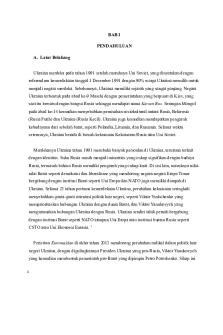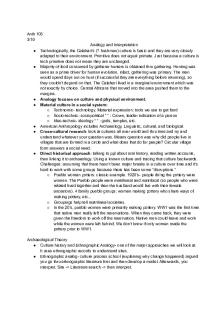Essay- National Identity and Archaeology PDF

| Title | Essay- National Identity and Archaeology |
|---|---|
| Course | Introduction to Archaeology |
| Institution | Canterbury Christ Church University |
| Pages | 2 |
| File Size | 59.7 KB |
| File Type | |
| Total Downloads | 74 |
| Total Views | 146 |
Summary
Essay- What role does archaeology play in construction national identity? ...
Description
To what extent does Archaeology have a role in the construction of national identity? Archaeology has been used both consciously and unconsciously to build up values and ideas in societies throughout the years. As oppose to world heritage, national identity is the idea of a nation being represented by distinctive traditions, culture, language and history. In an archaeological sense, the political and social values of a country can be based on heritage. How far archaeology has created this sense of national identity is however currently debated by the archaeological community, as well as journalists and nations themselves. Archaeology and heritage has been used for many years as propaganda by rulers in order to win over the support of the people. This was a technique used by the Nazis in Germany in the 1930s. Pottery styles were being associated with distinctive ethnic groups and to identify racial differences from skeletons by archaeologists. From this confusion of race with ethnicity, the Nazis drew up racial maps of Europe in order to identify what they believed to be superior races. In order to justify themselves as being a superior race, the Nazis fabricated archaeological ‘discoveries’, such as bowls marked with swastikas, which were intended to show the world they were carrying out conquest to retake land which had always been German. In this instance, false archaeology was used to reinforce fake claims to land, and a deceptive national identity. This method has also been used more recently in Israel, Bosnia and Ayodhya, and has led to violent political conflicts. The ability to control what is known about the past is used as a way of making political, social or economic claims legitimate. Many people have argued that each nation should decide what happens to its own heritage. The Elgin Marbles are an example of archaeology that has been disputed over many years. Greece, along with people from all over the world, believe that the Elgin marbles are part of the Greeks heritage, and therefore should be returned to the Parthenon. Others however believe that they belong in the British Museum as if they had remained in Greece, they would not have survived. This leads to the idea that archaeology can bring a country together, as if everyone passionately believes that their heritage belongs to them, it creates the idea of a national identity for the whole country. Many also believe that archaeology plays a very important role for nations who do not have a very long written history, as it allows them to discover their heritage from many years before. In more recent years, the fact that archaeology plays such a large role in national identity has in fact led to the destruction of artefacts and sites. In 2001, the world was shocked when the Taliban destroyed the ancient Bamiyan Buddhas in Afghanistan. The two statues were destroyed using explosives, purely as an act of terrorism. Many saw this not just as an attack on two ancient monuments, but in fact on the heritage and national identity of Afghanistan. This has also been seen in other countries. In 2015, Iraq was left devastated when ISIS extremists looted and bulldozed the ancient Assyrian city of Nimrud. This was seen as “defying the will of the world and the feelings of humanity”.
Although religiously motivated, many believe that these attacks are a way of unsettling nations, and making them feel threatened by destroying their heritage. More recently, ISIS captured the ancient city of Palmyra, and posted images and videos on social media of them destroying statues, desecrating artefacts and blowing up major monuments. This was done as a direct attack on the identity of those who would not conform, as it is against traditional Muslim beliefs to have any idolatry. For many, this is also an attack on culture. There are many that do not agree with national identity, and that in fact archaeology does not relate to it at all. Instead, they believe in the idea of world heritage. Archaeology does not belong to one particular country, and instead belongs to the heritage of the world. World heritage promotes the idea of using archaeology to educate, instead of it being used for political means. Museums like the British Museum are a good example of how archaeology can be brought together in order to represent history worldwide, rather than just a nation. In 2011, the British Museum brought artefacts from Afghanistan to England in order to educate people in the art and culture of Afghanistan that would otherwise never be usually seen. There are also charities and organisations that promote more advanced countries helping those who are struggling to preserve their own heritage. An example of this is how the Global Heritage Fund helped Cambodia to preserve the Banteay Chhmar temple, which is currently being lost to the jungle. Whilst helping to build up their own national identity, it is not for a political gain, and is helping different countries come together to protect heritage. Archaeology has been used over many years in the construction of a national identity. Whether it has been for a political gain, or it has been destroyed in order to make people unsettled. For many, archaeology provides people with a culture and an identity, and allows them to be proud of their history and there country where they come from. However, many people believe that archaeology is not national at all, and is in fact for everyone in the world. There therefore should be no such thing as national identity, and rather archaeology is for all and does not belong to anyone. Word Count- 1213 words...
Similar Free PDFs

Archaeology Dating Methods Essay
- 4 Pages

Identity essay
- 3 Pages

Archaeology
- 2 Pages

Gender identity essay
- 5 Pages

Cultural Identity Essay
- 3 Pages

National eatind disorder essay
- 2 Pages

The Fight for Identity - Essay
- 6 Pages
Popular Institutions
- Tinajero National High School - Annex
- Politeknik Caltex Riau
- Yokohama City University
- SGT University
- University of Al-Qadisiyah
- Divine Word College of Vigan
- Techniek College Rotterdam
- Universidade de Santiago
- Universiti Teknologi MARA Cawangan Johor Kampus Pasir Gudang
- Poltekkes Kemenkes Yogyakarta
- Baguio City National High School
- Colegio san marcos
- preparatoria uno
- Centro de Bachillerato Tecnológico Industrial y de Servicios No. 107
- Dalian Maritime University
- Quang Trung Secondary School
- Colegio Tecnológico en Informática
- Corporación Regional de Educación Superior
- Grupo CEDVA
- Dar Al Uloom University
- Centro de Estudios Preuniversitarios de la Universidad Nacional de Ingeniería
- 上智大学
- Aakash International School, Nuna Majara
- San Felipe Neri Catholic School
- Kang Chiao International School - New Taipei City
- Misamis Occidental National High School
- Institución Educativa Escuela Normal Juan Ladrilleros
- Kolehiyo ng Pantukan
- Batanes State College
- Instituto Continental
- Sekolah Menengah Kejuruan Kesehatan Kaltara (Tarakan)
- Colegio de La Inmaculada Concepcion - Cebu








